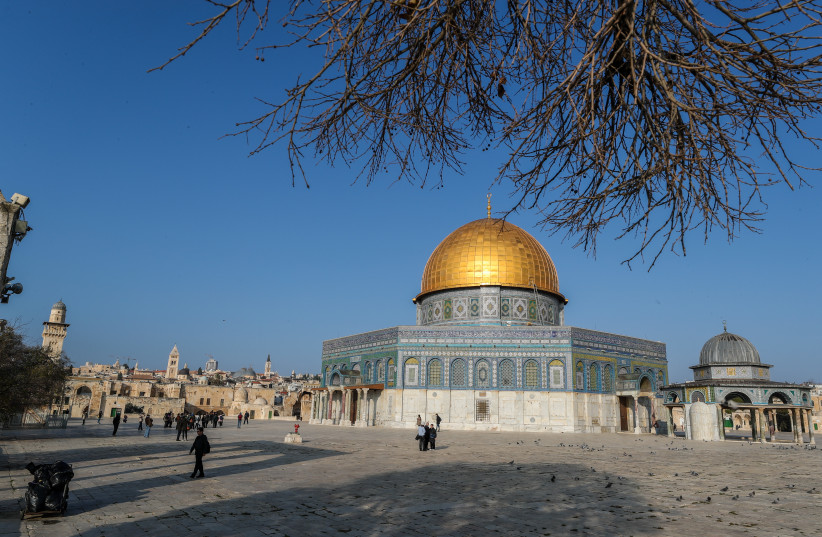The Biden administration plans to speak out against Israel at the United Nations Security Council debate late Thursday afternoon against any changes to the status quo of Jerusalem’s Temple Mount.
"We stand firmly for the preservation of the historic status quo, with respect to the holy sites in Jerusalem. Any unilateral action that departs from that historic status quo is unacceptable," US State Department speaker Ned Price told reporters in Washington.
He explained that the Biden administration planned to air that view when it spoke at the UNSC meeting in New York.
"We will be ready to reiterate our views to our fellow Security Council members," he said.
Just one day earlier he had said that National Security Minister Itamar Ben-Gvir’s brief 13-minute visit Tuesday morning to the Temple Mount, also known to Muslims as al-Haram, al-Sharif, was unacceptable.
Prime Minister Benjamin Netanyahu and his government have defended Ben-Gvir, arguing that his visit, which highlighted Israeli sovereignty over the site, was not a violation of the status quo that allows visitors to the site but forbids Jewish worship.
In a speech to the annual Jabotinsky conference on Wednesday, Netanyahu said that Israel planned to hold firm to its principles on the international stage.
“Instead of bowing our heads and submitting to the dictates from the international community, we will proudly uphold our interests in the State of Israel and the Land of Israel,” the prime minister said.
Netanyahu, whose sixth government was sworn in just last week, promised the Jerusalem audience that his coalition was in power to make changes including regarding Israel’s foreign relations.
"Instead of bowing our heads and submitting to the dictates from the international community, we will proudly uphold our interests in the State of Israel and the Land of Israel."
Prime Minister Benjamin Netanyahu
“We will carry out a revision in foreign relations: our voice will be heard in the world,” he said.
Netanyahu did not mention the international uproar that had been caused by Ben-Gvir’s Temple Mount visit.

Israel’s Ambassador to the United Nations Gilad Erdan denounced the Security Council debate as “ridiculous and unnecessary,” explaining that it was scheduled "only because the UN is a distorted and biased body in which Israel is discriminated against.”
He recalled that he had “visited the Temple Mount as internal security minister, and I will make it clear again tomorrow, in the debate, that Jewish visits to the Temple Mount are not a violation of the status quo.”
He added that “anyone who says otherwise is misleading [the public] and causes security and stability to be undermined.”
France on Wednesday issued its second condemnation of Ben-Gvir’s visit, explaining that it calls into question Netanyahu’s commitment to maintaining the status quo on the site.
Turkish Foreign Minister Mevlut Cavusoglu told his Israeli counterpart Eli Cohen, when he called to congratulate him on becoming foreign minister, that Ben-Gvir’s visit was provocative and unacceptable.
Cohen assured him that Israel was committed to freedom of worship in Jerusalem and that Ben Gvir’s visit fell within the dictates of the status quo arrangement.
The European Union and Germany have also spoken out against the visit.
King Abdullah II of Jordan, whose Hashemite Kingdom has a special custodial relationship with the Temple Mount, made a quick trip Wednesday to the United Arab Emirates.
The UAE and China had formally called the 15-member UNSC to convene. The United States, however, has blocked any action against Israel at the Security Council. It is one of five permanent UNSC members with veto power.
A Foreign Ministry official said Israel took the UNSC meeting very seriously since it dealt with the sovereignty of the Jewish state over its capital Jerusalem.
Controversy over the Temple Mount
The Temple Mount is the holiest site in Judaism and the third holiest in Islam and as such it operates under a complex arrangement. But it is located over the pre-1967 lines, in a section of the city that the Palestinian Authority and the international community believe should be within the final borders of a Palestinian state.
Israel annexed east Jerusalem after the Six-Day war in 1967 and formally applied sovereignty to it in 1980, a move that has not been recognized by any other country. Many countries do not even hold that Jerusalem is part of Israel let alone its capital.
The Palestinian Authority has gone further and has denied Jewish historical ties to the site.
Israel views the UNSC meeting as part of its battle for recognition of the Jewish state's historical and current ties to its holiest site.
The PA on Tuesday wrote a letter to the UNSC asking for a meeting to discuss Ben-Gvir’s visit.
It called on the Security Council to condemn the national security minister's actions as being a “belligerent attempt to assert Israeli sovereignty, in grave breach of international law, which absolutely prohibits the occupying power from altering the character, status and demography of the occupied territory” including east Jerusalem.
Its letter referred to the Temple Mount solely by its Muslim name.
Ben-Gvir is “a follower of the terrorist Kach Movement, has publicly called for dividing Al-Haram Al Sharif and for Jewish rituals to be performed there, in flagrant violation of the historic and legal status quo,” the PA wrote.
“The Security Council cannot remain a bystander in the face of this perilous situation and must make its voice heard and assert its authority,” it said.
“Only such urgent, serious action can avert the violent explosion and religious war that this Israeli government and its hateful, racist extremists are threatening to provoke, and can save the lives of the millions of Palestinian men, women and children endangered by this illegal colonial occupation and apartheid regime."
